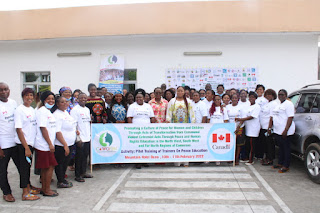CAWOPEM Leads Stakeholders To Fine-Tune Strategies For Peace Culture In Conflict Areas
By Mac Walters
Some stakeholders have fine-tuned strategies to promote peace culture within the conflict areas in the country. This was during a two-day training of trainers workshop on peace education organized in Buea last Friday, February 11-12, 2022.
The workshop organized by the Cameroon Women’s Peace Movement, CAWOPEM is part of a project funded by the Canadian High Commission in Cameroon.
According to one of CAWOPEM founding members, Dr Dorothy Fosack, the seminar which brought together teachers, community leaders, women leaders and religious actors was aimed at building a culture of peace.
“Peace culture is not well understood by many. Many don’t know that you need to be peaceful as a person for the peace culture to grow. We are trying to instill in individuals who are going to teach others what it means to be a peaceful person so that the culture of peace can spread out” Dr Fosack said.
With majority of the participants being women, Dr Fosack explained that: “Women have a peculiar role as child bearers, caregivers and are the foundation of every society and so have a key role to play in promoting peace culture,” she affirmed, adding noting that “the seminar also include men because there is inter-personal relationship, we need both women and men to build that peace culture we want. So we have a handful of men too”.
Going by the General Coordinator of CAWOPEM, Caryn Dasah, the Canadian High Commission funded project dubbed ‘building a culture of peace,’ targets three regions, that is, the North West, South West and the Far North Regions greatly imparted by armed conflicts.
“It did not start here because we have been in Mora in the Far North Region to organise similar activities just like we have done in Bamenda and Buea. The project is aimed at building and promoting a culture of peace,” the General Coordinator stated.
She further stressed that, “we want to take peace as a culture in our daily interactions and inculcate this into the lives of all Cameroonians so that we can build peace”.
“The first phase of this project was a school education programme which we started in December. We went to schools and had a programme on peace and non-violent communication. The second phase was based on intergenerational dialogue which we brought in stakeholders like traditional leaders, women leaders, men to redefine various community dialogue structures so that they can go back and function.
Today, the training of trainers’ workshop is for teachers, community leaders, women leaders, religious actors and other stakeholders” Dasah further explained.
Meanwhile, at the end of the one-day seminar, a manual on peace education was produced to enabled the close to 100 participants, use as guideline for spreading peace culture as they returned to their classrooms, communities and various settings.
According to Atefor Yvodia, a teacher and one of the participants lauded the training describing it as “timely”.
“As a primary school teacher, my expectation is to first learn strategies to teach peace education to my learners because it is my part of their curriculum. Moreover, as a woman, wife, I need to know how to manage conflict situations at home or in the society,” Atefor added.
Presentations
made during the seminar focused on CAWOPEM peace education manual, role of
women in peace building, impacts of armed conflicts on women and girls,
non-violent communication and effective communication, as well as action
planning for promotion of peace in schools and communities.






Comments
Post a Comment